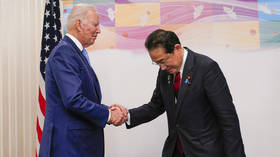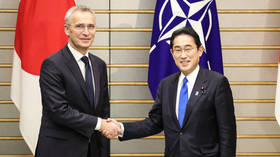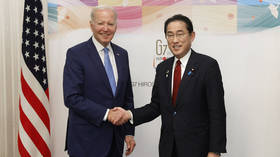The G7 is an outdated tool of the US neo-empire
Washington has co-opted both the winners and the losers of World War II into defending Western domination around the globe

The summit of G7 nations took place in Hiroshima, Japan over the last weekend.
Hiroshima is significant for a few reasons. First of all, it is known to the world as the location that the United States nuked, along with Nagasaki, at the end of World War II, which led to the surrender of the Empire of Japan and that country’s transformation into a US client state.
Secondly, Japan is working to remilitarize itself in line with America’s dual containment effort against China and Russia. Thus, while Japan is chair of the G7 this year, the event was a rubber-stamping of US-centric geopolitical goals which took aim at both countries.
However, what might be said about the G7 itself? Founded as a Cold War-era organization in 1975, and briefly incorporating the West’s aspirations for post-Soviet Russia, the group professes to represent the world’s “most advanced industrial countries,” but anyone could tell you this is an outdated category. Countries such as China and India, with economies larger than most G7 members, are not part of the group. Rather, the character and agenda of the G7 is distinctly ideological, and its goal is to preserve a Western-dominated concept of the world at all costs.
It should not go unnoticed that the G7 is an effective aggregation of former empires that once dominated the world unchallenged, now held under the wings and servitude of the US. Remarkably, all three Axis powers of World War II, defeated by the allies, are a part of this grouping. Although the respective fascist-oriented regimes of Germany, Italy and Japan were rightfully destroyed, these countries were all rebuilt as American client states following the war and their respective interests placed in the hands of Washington.
Similarly, the allied empires, which emerged victorious, including France, Britain and its imperial dominion, Canada, found that the war had severely depleted their national resources and strength to the point they could no longer continue as the global superpowers they had been. Consequently, they surrendered their leadership baton to the US and have ever since relied on following its lead to secure their interests around the world.
In each instance, all of these countries held positions of privilege from their imperial eras. Having colonized most of the globe, and Japan having militarily occupied much of Asia, these countries had made themselves tremendously wealthy. Britain’s fabulous wealth, for one, is tailored directly to the exploitation of Africa and India. Colonial empires were strictly commercial in character, using ideology as a justifying force for aggression, upholding their economic interests by immense military power. This gave these countries privilege, which thus formed the distinction between the Global North and the Global South.
Unable to carry their empires forward, either by exhaustion or defeat, these respective countries seek to sustain the unfair economic privileges they attained through compliance with the US, a “neo-empire” which is the inheritor of the international order they created. Thus, the G7, the aggregation of all these countries into one ideological grouping, is no coincidence. Their respective goal is to maintain their own economic privileges and to attempt to suppress changes in the international order that threaten their position, which in this case is the rise of the Global South and China.
On this note, the G7 buys into the US-led goals of attempting to blockade China from making breakthroughs in high-end technologies. It also wants to stop other countries from buying into Beijing’s development model and to sustain the fundamental gulf in wealth between the Global North and South. It wants to be the only group entitled to impose massive sanctions and embargoes on other countries and then decry China’s defense of its interests as “economic coercion.”
They also want to make sure that neither China nor Russia can challenge the West’s historic military dominance. The US has thus in effect co-opted both the winners and losers of World War II (minus the USSR) into one grouping and used it to continue the same world they were vested in. However, one undeniable fact is that the world is changing in ways that are not favorable to the G7. They no longer have that degree of dominance, and their share of global GDP is only going to shrink. As the BRICS economies continue to grow and multipolarity emerges, their own little exclusive club is hardly in a position to try and dictate the flow of the global economy.
This little club wants to remain rich, while stopping everyone else from enriching themselves as well. It isn’t going to work.
The statements, views and opinions expressed in this column are solely those of the author and do not necessarily represent those of RT.
https://www.rt.com/news/576841-g7-us-imperial-goals/



0 Comments:
Post a Comment
Subscribe to Post Comments [Atom]
<< Home